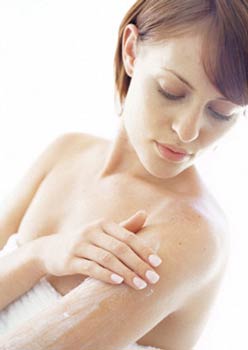Tips to Avoid the Itchy, Dry Skin of Winter
 Just add water. Moisturizing means keeping water in your skin. In winter months when the humidity is low, water in the skin rapidly evaporates resulting in dry skin.
Just add water. Moisturizing means keeping water in your skin. In winter months when the humidity is low, water in the skin rapidly evaporates resulting in dry skin.
Grease is good. The basic job of a moisturizer is to hold water in the skin rather than to add water. Creams generally work better than lotions. Nothing holds water that is already in your skin better than petroleum jelly.
Time it right. Apply moisturizers right after toweling off, before the water in your skin that was absorbed while in the bath or shower has time to evaporate.
Don't skip. Water is a two-edged sword. Water IN your skin means moist skin, but water you bathe in (especially hot and soapy) strips your skin of its natural protective oils allowing more rapid evaporation. Five minutes after your shower your skin will be drier than before you bathed. ALWAYS moisturize after bathing.
Don't skimp. Buy products you can easily afford, and be generous when applying.
Keep it simple ... ingredients. The ingredients in moisturizers that work are safe and inexpensive. Fancy packaging, fragrance and extravagant claims boost cost. Look for ingredients like oils, glycerin, propylene glycol, ammonium lactate, glycolic acid and urea.
Keep it handy. Hands take a beating in winter. Moisturize every time you wash your hands -- more if possible. Keep your moisturizers scattered around the house, at work and in the car. Avoid greasiness by choosing products containing lots of glycerin. For most people waterless antiseptic hand cleaners are easier on the hands than repeated washing.
Soap sucks -- oil off your skin. Soap strips off your skins natural protective oils. Look for moisturizing cleansers which are widely available, and won't leave you feeling too squeaky-clean.
Getting it on -- your back. That very itchy central back is impossible to reach. Get your significant other to apply moisturizer whenever possible.
Desperately dry deserves a dermatologist. Excessive dryness can lead to eczema, and may require a visit to a dermatologist for treatment.
Posted at 10:55 AM | Labels: dry skin treatment, skin care tips, winter |

0 comments:
Post a Comment